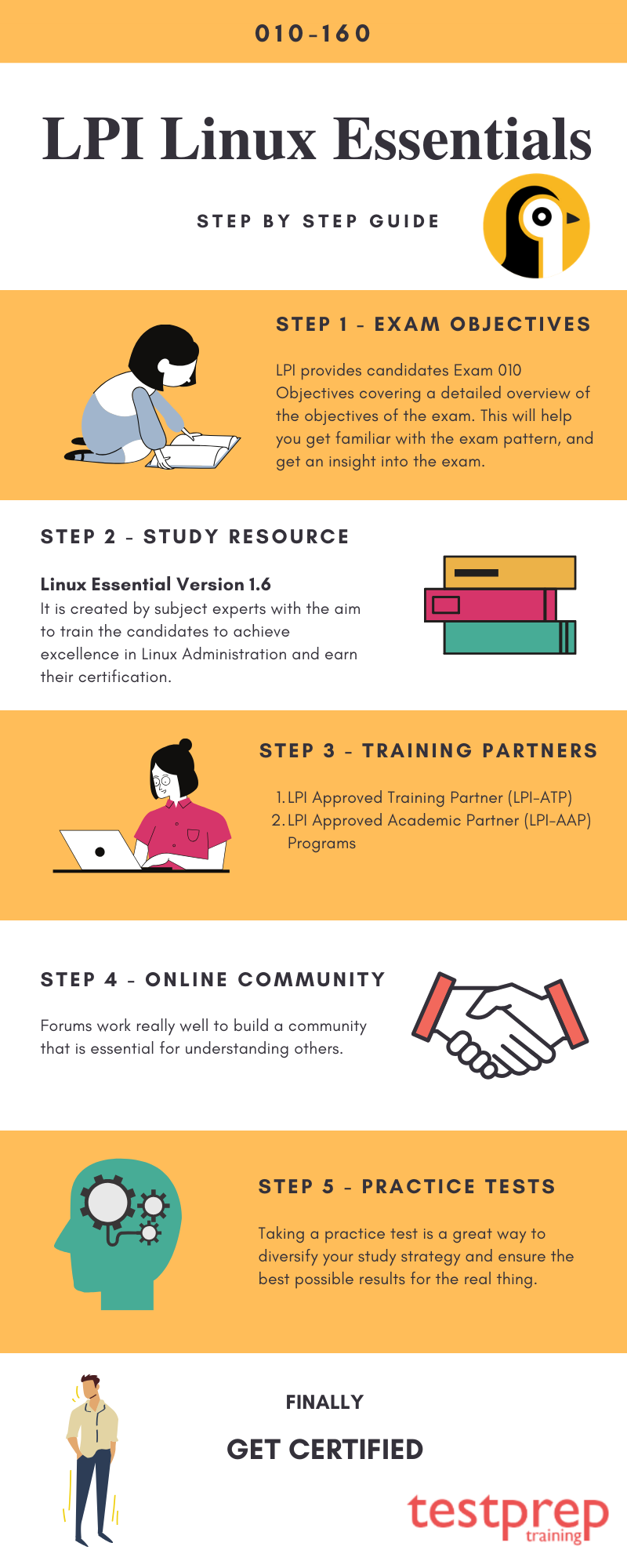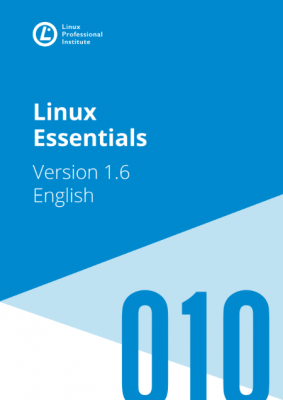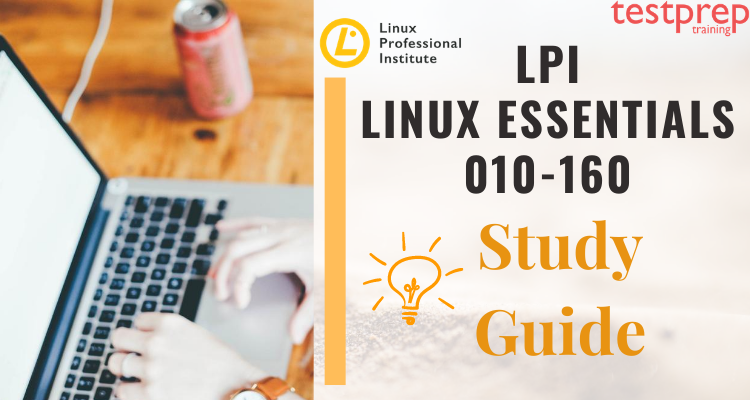The LPI Linux Essentials (010-160) certification is for people who are just starting with Linux and open-source tech. It includes a fundamental understanding of Linux commands, basic system setup, managing files, and security.
To obtain the LPI Linux Essentials certification, candidates must pass a single exam (010-160) that consists of 40 multiple-choice questions. The test lasts for 60 minutes, and you need to score at least 500 out of 800 to pass.
The exam covers the following topics:
- The Linux Community and a Career in Open Source
- Finding Your Way on a Linux System
- The Power of the Command Line
- The Linux Operating System
- Security and File Permissions
- Basic Networking
- A Brief Introduction to Shell Scripting
The LPI Linux Essentials certification is a good starting point for those who are interested in pursuing a career in Linux system administration or open source technology. This certification gives you a strong starting point for your knowledge, and you can add to it with more advanced certifications like LPIC-1, LPIC-2, and LPIC-3.
Before moving to the glossary part and further details, let’s checkout some sample questions.
1. Which command would you use to list the files in a directory, including hidden files?
a. ls
b. dir
c. ls -a
d. dir -a
2. What is the command to create a new file named “example.txt” in the current directory?
a. create example.txt
b. touch example.txt
c. touch create example.txt
d. newfile example.txt
3. What is the default file permission for newly created files in Linux?
a. 600
b. 644
c. 755
d. 777
4. Which command would you use to display the IP address of your Linux system?
a. ifconfig
b. ipconfig
c. ping
d. traceroute
5. What is the purpose of the chmod command in Linux?
a. To change file ownership
b. To change file permissions
c. To create a new file
d. To display the contents of a file
Answer:
- c. ls -a
- b. touch example.txt
- b. 644
- a. ifconfig
- b. To change file permissions
LPI Linux Essentials 010-160: Glossary
- Access Control List (ACL): A set of rules that determine which users or groups are granted access to files or directories and what level of access they have.
- Alias: A shortcut or alternative name for a command or file.
- Apache: Open-source web server software that’s used to put websites and applications on the internet.
- Archive: A file containing one or more other files, often compressed to reduce storage space.
- Bash: A popular shell (command-line interface) for Linux and other Unix-based operating systems.
- Boot loader: A program that loads the operating system into memory and starts its execution.
- Command: A command or a group of commands that you tell a computer to do a particular job.
- Compiler: A software program that converts source code written in a programming language into executable machine code.
- Daemon: A background job that keeps running on a computer system, usually handling tasks related to the system itself.
- Encryption: Turning regular text into a secret code to stop people from getting into data they shouldn’t.
- File system: The way data is organized and stored on a disk, including the layout of files, directories, and other structures.
- Firewall: A safety system that manages who can use a network or system by following specific rules to decide if they’re allowed or not.
- Hard link: A reference to a file that allows it to be accessed from multiple locations on the file system without creating a duplicate copy.
- Home directory: The default directory for a user’s personal files and configurations.
- Init: The first process that runs on a Linux system and initializes the system’s processes and services.
- IP (Internet Protocol): The protocol used for sending data over the internet.
LPI Linux Essentials 010-160 Exam Guide
Here are some LPI Linux Essentials 010-160 exam study resources with links:
- LPI Linux Essentials Exam Objectives – The official exam objectives published by the Linux Professional Institute (LPI). This document outlines the topics covered in the exam and provides a detailed description of the knowledge and skills required to pass the exam.
- Linux Essentials Certification Exam Guide – Christine Bresnahan and Richard Blum’s book offers a complete look at what’s in the exam. It also has practice questions and activities to get you ready for the test.
- LPI Linux Essentials Certification All-in-One Exam Guide – This book by Robb Tracy is another comprehensive resource for studying for the LPI Linux Essentials certification exam. It includes review questions, practice exams, and a glossary of key terms.
- Linux Academy Linux Essentials Course – Linux Academy provides a comprehensive online course that covers all of the topics in the LPI Linux Essentials certification exam. The course includes video lectures, practice exams, and hands-on labs.
- LPI Exam Prep – On this site, you can find practice questions for the LPI Linux Essentials certification test. You get to choose how many questions you want and how tough they should be to make your practice just right for you.
It’s important to note that while these resources can be helpful in preparing for the exam, they should not be the sole source of preparation. Candidates should also have hands-on experience with Linux operating systems and open-source software to ensure a thorough understanding of the topics covered in the exam.
LPI Linux Essentials 010-160 Exam tips and tricks
Here are some tips and tricks that may be helpful for the LPI Linux Essentials 010-160 exam:
- Review the exam objectives: Familiarize yourself with the topics and skills that will be cover on the exam. Make sure you understand the concepts and can perform the tasks listed in the objectives.
- Practice with Linux: Get hands-on experience with Linux by installing a Linux distribution on your computer or using a virtual machine. Practice using the command line, managing files and directories, configuring network settings, and other tasks relevant to the exam.
- Use study materials: Utilize study materials such as books, online courses, and practice exams to help prepare for the exam. The LPI website also provides resources, including study guides and sample questions.
- Manage your time: The exam has a time limit, so make sure you manage your time effectively. Try to answer easier questions first and allocate more time for difficult questions.
- Read questions carefully: Pay attention to the wording of the questions and make sure you understand what is being ask. Don’t assume anything and read each question carefully before answering.
- Check your work: Before you finish the exam, take a look at your answers to double-check if you’ve answered every question and didn’t make any silly errors.
- Stay calm and focused: It’s normal to feel nervous during the exam, but try to stay calm and focused. Take deep breaths, manage your time effectively, and approach each question with a clear mind.
Remember that the LPI Linux Essentials 010-160 exam is design to test your knowledge of Linux fundamentals. With adequate preparation and practice, you can pass the exam and demonstrate your proficiency in Linux.
LPI Linux Essentials 010-160 Study Guide

Step 1- LPI Linux Essentials 010-160 Exam Objectives
LPI provides you with the Exam 010 Objectives covering a detailed overview of the objectives of the exam. This will help you get familiar with the exam pattern, and get an insight into the exam. Thereby, helping you in strategizing your LPI Linux Essentials (=010-160 exam preparation. Also, having the utmost clarity about the exam concepts is of utter importance in this exam given its vast syllabus. The major 5 domain that this exam covers are-
Domain 1: The Linux Community and a Career in Open Source
The first domain covers concepts like linux evolution and popular operating systems, major open source applications and open source software and licensing. It also includes ict skills and working in linux
Domain 2: Finding Your Way on a Linux System
Further this domain includes command line basics, and using the command line to get help. It also covers using directories and listing files , creating, moving and deleting files.
Domain 3: The Power of the Command Line
This domain focuses on archiving files on the command line, searching and extracting data from files and turning commands into a script.
Domain 4: The Linux Operating System
Moreover, this domain emphasizes on choosing an operating system, understanding computer hardware. It includes concepts like where data is store and your computer on the network.
Domain 5: Security and File Permissions
This domain includes the basic security and identifying user types, creating users and groups and managing file permissions and ownership. It also covers special directories and files.
Step 2 – Study Resources – Linux Essential Version 1.6

LPI has provided study resources for the candidates taking the LPI Linux Essentials 010-160 certification exam. This will help you gain command of the various know-how of the Linux administration system. Also, it is create by subject experts with the aim to train the candidates to achieve excellence in Linux Administration and earn their certification. Visit Linux Essential Version 1.6 and start preparing for the LPI Linux Essentials 010-160 Exam. The two LPI Linux Essentials (010-160) study resources are –
- Linux Essentials – By Linux Professional Institute
- Linux Essentials – By NDG
Step 3 – LPI Training Partners
LPI offers several Training Partners to train candidates and give them the right exposure for its certification exam. Enrolling for this training will provide you with expert coaches to guide you to meet the various objectives of the Linux Essentials 010-160 Exam, and get certified in the first attempt. These are LPI-certified instructors, who instruct you, keeping the LPI training, and academic code of ethics in adherence. The study material provide is also approved by LPI, to help give a thorough insight to the candidates into the objectives of the exam.
- LPI Approved Training Partner (LPI-ATP)
- LPI Approved Academic Partner (LPI-AAP) Programs
Step 4 – Join Online Community
Joining the LPI Online Community is certainly an ideal way to know your actual stand in the competition. Here, you can interact with your competitors, and keep yourself focused. This will provide you the right exposure to appear for the LPI Linux Essentials 010-160 Exam, ensuring an increase in your expertise in Linux system administration. You get to solve your doubts as and when they arise. Having different perspectives makes things more interesting. These conversations help the learning become more complete. It’s a good opportunity for quiet people to share their thoughts, even if they usually don’t talk much. Forums are great for building a community, which is important for getting to know others.
Step 5 – Self evaluate with Practice Tests
To understand the fundamental Linux administration skills, and hence, prepare for the Linux Essentials 010-160 certification, solving practice tests is a must. This will help you attain readiness and the ability to tackle real-time scenarios. On analyzing your answers, you will be able to identify the areas, where you need to pay extra attention. No matter how you get ready for the Linux Essentials 010-160 Exam, doing a practice test or two can be surprisingly helpful. Taking an LPI Linux Essentials 010-160 practice test is a smart way to change up how you study and make sure you do your best when it’s time for the actual exam. Let’s Start Practising!



